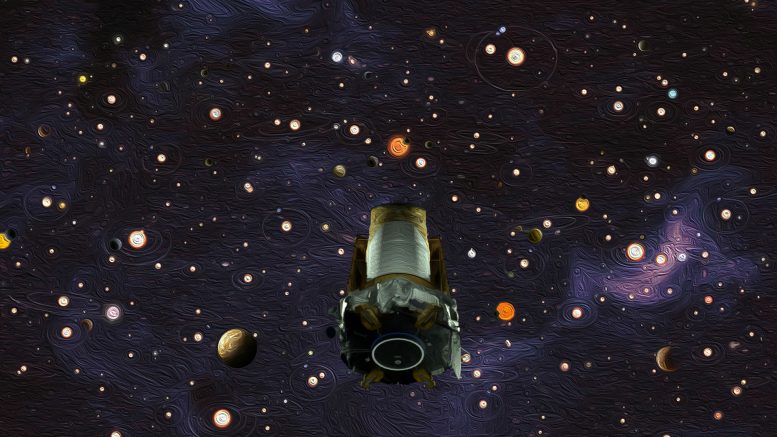
This illustration depicts NASA’s exoplanet hunter, the Kepler space telescope. Credits: NASA/Wendy Stenzel/Daniel Rutter
In a newly released study, researchers state that the Kepler spacecraft has found over 2,300 candidate exoplanets in its observations during the first sixteen months of operation.
There are currently 861 exoplanets (planets around other stars) according to the official exoplanet encyclopedia website. This list includes only the objects that have been confirmed as exoplanets; most of them have many of their physical parameters reasonably well determined, for example, their masses and orbits. Many more objects have been spotted as potential, or “candidate,” exoplanets, but additional observations and analyses are needed to verify their reality as exoplanets.
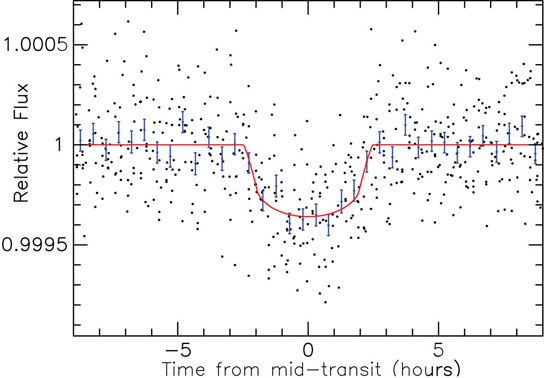
KOI-2124.01 – The signature of the smallest known planet, KOI-2124.01, near its habitable zone. This plot of intensity versus time shows how the light from the star dims ever so slightly as the exoplanet candidate passes across the star as seen from the Earth. Credit: NASA/Kepler; Batalha
How many? Writing in the latest issue of the Astrophysical Journal Supplement, a team of fourteen CfA astronomers, along with fifty-two of their colleagues, announced the figures. In the first sixteen months of operation, the Kepler spacecraft, which began operations in May, 2009, has found over 2300 candidate exoplanets in its observations (which examined over 190,000 stars). The new figure includes updates to earlier exoplanet candidate estimates and is based not only on additional observations but also on new data analysis techniques. Applied to the earlier datasets, these new techniques are better able to identify smaller candidates.
The huge new compilation significantly boosts the number of potential Earth-sized planets. More than 91% of the new candidates are smaller than Neptune; the number of candidates smaller than two Earth-radii jumped by 201%, with 624 new candidates. The fraction of stars hosting systems with more than one planet has also grown, from 17% to 20% of the total number of stars with planets. The new results are tantalizing in one other respect: the possibility that Earth-sized planets in their habitable zone (where water can remain liquid) will soon be discovered.
Publication: “Planetary Candidates Observed by Kepler. III. Analysis of the First 16 Months of Data” by Natalie M. Batalha, Jason F. Rowe, Stephen T. Bryson, Thomas Barclay, Christopher J. Burke, Douglas A. Caldwell, Jessie L. Christiansen, Fergal Mullally, Susan E. Thompson, Timothy M. Brown, Andrea K. Dupree, Daniel C. Fabrycky, Eric B. Ford, Jonathan J. Fortney, Ronald L. Gilliland, Howard Isaacson, David W. Latham, Geoffrey W. Marcy, Samuel N. Quinn, Darin Ragozzine, Avi Shporer, William J. Borucki, David R. Ciardi, Thomas N. Gautier III, Michael R. Haas, Jon M. Jenkins, David G. Koch, Jack J. Lissauer, William Rapin, Gibor S. Basri, Alan P. Boss, Lars A. Buchhave, Joshua A. Carter, David Charbonneau, Joergen Christensen-Dalsgaard, Bruce D. Clarke, William D. Cochran, Brice-Olivier Demory, Jean-Michel Desert, Edna Devore, Laurance R. Doyle, Gilbert A. Esquerdo, Mark Everett, Francois Fressin, John C. Geary, Forrest R. Girouard, Alan Gould, Jennifer R. Hall, Matthew J. Holman, Andrew W. Howard, Steve B. Howell, Khadeejah A. Ibrahim, Karen Kinemuchi, Hans Kjeldsen, Todd C. Klaus, Jie Li, Philip W. Lucas, Søren Meibom, Robert L. Morris, Andrej Prša, Elisa Quintana, Dwight T. Sanderfer, Dimitar Sasselov, Shawn E. Seader, Jeffrey C. Smith, Jason H. Steffen, Martin Still, Martin C. Stumpe, Jill C. Tarter, Peter Tenenbaum, Guillermo Torres, Joseph D. Twicken, Kamal Uddin, Jeffrey Van Cleve, Lucianne Walkowicz and William F. Welsh, 5 February 2013, The Astrophysical Journal Supplement Series.
DOI: 10.1088/0067-0049/204/2/24

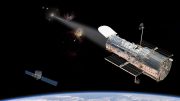

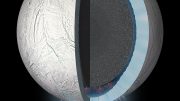
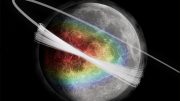




Be the first to comment on "Kepler Finds Over 2,300 Candidate Exoplanets"